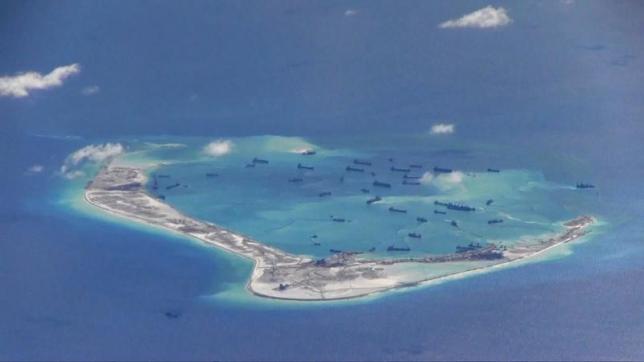China urges Australia to be 'cautious' on South China Sea
China hopes that Australia acts and speaks with caution on the South China Sea and that its words and actions on the matter match each other, a senior Chinese officer told the visiting head of the Australian Defence Force.
Australia, a staunch US ally, has previously drawn criticism from China for running surveillance flights over disputed islands in the South China Sea and supporting US freedom of navigation exercises there.
However, Australia has not conducted a unilateral freedom of navigation voyage of its own.
Meeting in Beijing, Vice Chairman of China's Central Military Commission Fan Changlong told Australia's Air Chief Marshal Mark Binskin that China hopes to push forward the healthy and stable development of bilateral military ties, China's Defence Ministry said late on Wednesday.
China "hopes that on the South China Sea issue the Australian side can speak and act cautiously, and that its words and deeds match", the ministry paraphrased Fan as saying.
He did not elaborate.
China claims almost the entire South China Sea where about $5 trillion sea-borne trade passes annually. Brunei, Malaysia, the Philippines, Taiwan and Vietnam also have claims on parts of the sea, which is believed to have rich deposits of oil and gas.
China has been angered by US freedom of navigation patrols in the South China Sea, while China's building of artificial islands there including new airstrips has rattled nerves around the region.
China says much of the building and reclamation work it has been doing in the South China Sea is to benefit the international community, including for civilian maritime navigation.
China claims almost all of the South China Sea, through which ships carrying about $5 trillion in trade pass every year. Brunei, Malaysia, the Philippines, Taiwan and Vietnam also have claims in the sea, which is also believed to be rich in energy resources and fish stocks.
In July, an arbitration court in the Hague said China's claims to the waterway were invalid, after a case was brought by the Philippines. Beijing has refused to recognize the ruling.
Australian Prime Minister Malcolm Turnbull discussed the South China Sea with Chinese President Xi Jinping last month, stressing the importance of complying with international law.






